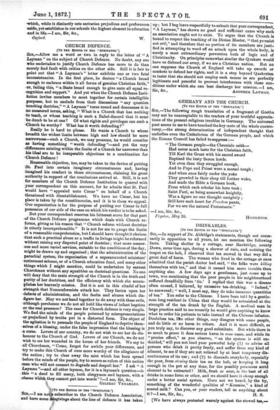CHURCH DEFENCE.
[TO THE EDITOR OF THE "SPECTATOR.')
'&,—Allow me a word or two in reply to the letter of "A Layman" on the subject of Church Defence. No doubt, any one who undertakes to justify Church Defence has more to do than merely find fault with critics on the other side. Still it is fair to point out that "A Layman's" letter exhibits one or two fatal -inconsistencies. In the first place, he desires "a Church broad enough to embrace within it all forms of genuine Christian faith," • or, failing this, "a State broad enough to give unto all equal re- -cognition and support." And yet when the Church Defence Insti- tution invites members to meet together for certain intelligible purposes, but to exclude from their discussions "any question touching doctrine," "A Layman" turns round and denounces it in no measured terms, asking, "What is a Church that has nothing -to teach, or whose teaching is such a Babel-discord that it must be dumb to be at one? Of what rights and privileges can such a -Church be worthy? What has it worth defending?"
Really he is hard to please. He wants a Church to whose
breadth the widest limits between high and low should be mere narrowness—such a Church, we may presume, he would consider as having something "worth defending "—and yet the very .differences existing within the limits of a Church far narrower than his ideal are to be insuperable objections to a combination for 'Church Defence I
Reasonable objection, too, may be taken to the device of putting 'St. Paul into certain imaginary circumstances and, having imagined his coaduct in those circumstances, claiming his great authority in support of the conclusions arrived at. Still, it is not for members of the Church Defence Institution to quarrel with your correspondent on this account, for he admits that St. Paul would have "appealed unto Cmsar " on behalf of a Church threatened with disestablishment. We have no C..sar, but his place is taken by the constituencies, and it is to them we appeal.
Our organization is for the purpose of putting our Caasar in full possession of our side of the case on which his verdict is to be asked. But your correspondent reserves his bitterest scorn for that part
of the Church Defence programme which deals with Church re- forms, giving as his reason that " Church reform without doctrine is utterly incomprehensible." It is not for me to gauge the limits of a reasonable comprehension, but I should have thought it obvious -that such a practical abuse as a traffic in livings might be reformed without raising any disputed point of doctrine ; that more numer- -ens and more varied services, suitable to the conditions of the day, might be drawn up and organised ; that the administration of the parochial system, the organisation of a superannuated ministers' 'retirement scheme, or of a Church education fund, and many other things which I might mention, could be undertaken by earnest Churchmen without any squabbles on doctrinal questions. No one will deny that the main strength of the Church is in the truth and purity of her doctrines, and the efficiency with which she accom- plishes her heavenly mission. But it is not in this citadel of her strength that Nonconformists attack her. They fasten upon her • defects of administration, and the faults and abuses which dis- Sgure her. May we not band together to do away with these evils, -although perchance we do not all hold like views of infant baptism or the real presence? The case for Church defence is very simple. We find the minds of the people poisoned by misrepresentations -or prejudiced by truths put in a distorted form. The object of the agitation is to persuade the people of England to deprive them- selves of a blessing, under the false impression that the blessing is a curse. Lovers of our country, we do not wish to see her do dis- ‘honour to the Church of God. Lovers of our Church, we do not wish to see her wounded in the house of her friends. We say to all Churchmen, "Come, forget for awhile your differences, and try to make this Church of ours more worthy of the allegiance of the nation ; try to clear away the mist which has been spread before the minds of the people, try to secure as rulers of this nation ,men who will not consent to degrade and despoil her." I ask "A Layman "—and all other laymen, for it is a layman's question—is this "a deed to fill many, both clergymen and laymen, with a .shame *Ida they cannot put into words"?-4 am, Sir, &c.,
GILBERT VENABLES.


































 Previous page
Previous page